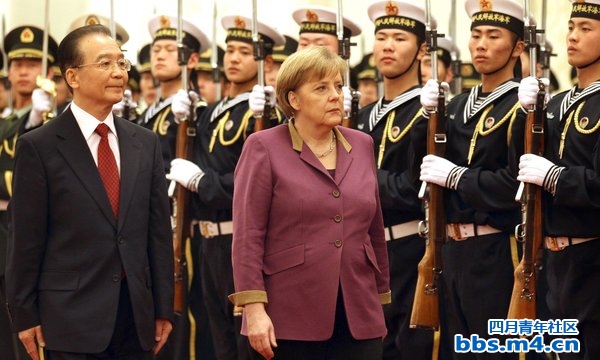|
|
【原帖地址】:http://www.nytimes.com/2012/02/03/business/global/china-considers-offering-aid-in-europes-debt-crisis.html?_r=1
【原文标题】:China Considers Offering Aid in Europe’s Debt Crisis
【译者】MacTavish_Tang
【翻译方式】人工
【声明】欢迎转载,请务必注明译者和出处 bbs.m4.cn。
【译文】:

(温家宝总理陪同来访的德国总理默克尔。)
温家宝总理于本周三表示,中国将会考虑与国际货币基金组织(IMF)合作,一同帮助解决欧洲债务危机。然而温家宝总理并未就中国是否愿意降低此前援助欧洲各国而提出的“苛刻”条件作出明确表态。
温家宝总理是在与德国总理默克尔完成会晤后举行的一个新闻发布会上发表此番评论的。
德国总理默克尔是本月第一个访华的欧洲国家领导人,在她之后还将有其他国家的领导人陆续登门拜访。中国所持有的庞大的外汇储备已经开始凸显其影响,甚至可能媲美华盛顿方面在金融领的影响力。
温家宝总理声称:中方有关部门正在对中国通过国际货币基金组织(ESM)出资的具体方式,以及通过欧洲金融稳定基金(EFSF)和欧洲稳定机制(ESM)等渠道,更多参与解决欧债问题进行研究和评估。温家宝总理还表示:中国可能会通过国际货币基金组织(IMF)来发挥自己的作用。
首先,中国将向国际货币基金组织(IMF)提供贷款;然后,国际货币基金组织(IMF)贷款给欧洲各国。这将有效降低受援助国违约的风险。此前中国曾明确表示,中国如若向欧洲提供贷款,需要更多的风险缓冲措施。
去年12月俄罗斯提出的贷款方式如今正在被中国权衡中,但是俄罗斯仅愿意向国际货币基金组织(IMF)提供20亿美元的贷款。然而欧洲所亟需的是,是数千亿美元的救助资金。
英国方面也表示,他们将考虑向国际货币基金组织(IMF)“输送”更多的资金,以帮助欧洲度过此次危机。但英国人给出的条件是,欧洲各国必须明确的表明他们将采取有力的措施来遏制危机蔓延。
截至去年12月,中国外汇储备已高达3.18万亿美元,这让其他国家相形见绌。中国外汇储备是一股强大的力量,它有可能对稳定全球金融秩序作出巨大贡献。
如果获得了来自中国的援助资金,那将有助于恢复国际投资界对欧洲市场的信心。这也将标志着,中国人相信默克尔和其他欧洲国家领导人已采取必要步骤,以解决欧洲的主权债务危机。
不过,一个难以回避的问题是,中国希望通过援助换取何等的政治或贸易的让步。
去年9月,温家宝总理曾建议欧盟可以取消对中国出口低价商品的法律限制。但这个建议很快就被欧盟贸易专员否决了。
本周四,一篇发表在中国官方媒体,《中国日报》上的评论文章再次提出了温家宝总理的贸易条件,并建议欧洲联盟也应该作出政治让步,比如解除对华武器禁运。文章声称:“中国有句古谚,无事不登三宝殿。”
国际货币基金组织的常务董事Christine Lagarde一直以来扮演了很重要的角色。她在促成债权国与债务国之间(如德国与希腊)达成令双方都感到满意的协议时起了突出作用。这包括将440亿欧元(约合577亿美元)的临时性欧洲金融稳定基金(EFSF)转移到包含500亿欧元(约合655亿美元)的欧洲稳定机制(ESM)中去。
欧洲与中国之间的联系已经持续了两年,欧洲方面的目的是说服中国政府增持占其外汇贮备1/4的欧元——主要由欧洲经济最强的国家发行的政府债券;以及使中国的外汇储备多元化——即购买欧元区受债务危机困扰的国家的债券。
那些熟知中国的立场的经济学家和官员们反复强调,中国愿意帮助欧洲,但是前提是她的贷款基本不会有风险。为了达到这一要求,欧洲各国可以共同还贷,即使其中有些国家拖欠贷款。然而,德国对于任一可能使它成为其他国家的债务担保人的决议都持谨慎态度,并且,没有迹象表明,德国的态度有所转变。
另一种解决中国对其投资风险的担忧的方式是,由国际货币基金组织承担赔偿责任。
中国的官员曾在去11月和12月上旬表明,他们对于帮助欧洲顾虑重重。他们公开指出,中国的外汇储备是属于中国人民的,是政府向人民借来的。北京方面则暗示,他们对于投资海外基础设施建设的兴趣远大于购买外国政府债券。
但此后,欧洲的危机感有所减弱。这主要是因为欧洲央行在12月中旬开始以非常低的利率向欧洲的商业银行提供大规模的三年长期贷款,希望以此削弱市场对爆发雷曼兄弟式的清偿危机的担忧。
不过,欧洲债务危机仍未结束。欧元区被预计今年仍将忍受经济衰退的煎熬。希腊正在四处筹钱偿债,避免在下个月出现违约的状况。因此,稳定欧洲金融的谈判仍然迫在眉睫。
对于中国而言,一个优先的目标是,防止人民币对欧元的汇率出现较大的波动。比如让人民币升值,这会使得中国商品在欧洲的竞争力下降,而欧洲是中国最大的出口市场。
温家宝总理在记者会上声明:“中国支持欧洲的维护欧元的稳定。”
德国此前一直支持美国要求人民币升值的要求。但此次访华,默克尔对人民币升值这一问题十分慎重,仅声明在人民币的地位及可兑换性问题上,中德两国应当协作。
==========================================================================
【原文】:
HONG KONG — Prime Minister Wen Jiabao said Thursday that China would consider working with the International Monetary Fund to help shore up Europe’s finances. But he left unclear whether China was willing to drop conditions that so far have made its proposed help unappealing to European nations.
Mr. Wen’s comments came at a Beijing news conference after he met with Chancellor Angela Merkel of Germany on the first day of her three-day visit to China.
Mrs. Merkel is the first of several European leaders scheduled to visit China this month, as China’s huge holdings of foreign exchange reserves have begun to give it financial influence that could potentially rival Washington’s.
Mr. Wen said that Chinese officials were studying whether the country should be “involving itself more” in helping Europe solve its debt troubles by investing in the region’s two big rescue packages: the existing European Financial Stability Facility and the planned European Stability Mechanism. China’s contributions could be channeled through the I.M.F., he said.
Lending money to the I.M.F. to, in turn, relend to Europe would effectively transfer more of the risk of any European debt default to the I.M.F. China has previously made clear that it would need to buffer the risk of lending more money to Europe.
In December Russia embraced the lending approach now being weighed by China, but Moscow was willing to lend the I.M.F. only $20 billion. Europe is trying to expand its bailout funds by hundreds of billions of dollars.
Britain has also said it would consider sending more money to the I.M.F. to help with Europe’s troubles — but only after the Europeans demonstrated they were finally taking bold steps to stem the contagion.
China had $3.18 trillion in foreign exchange reserves at the end of December, dwarfing the reserves of every other country and potentially giving it the financial firepower to make a significant contribution.
Having Chinese money on the table could help restore the international investing community’s confidence in Europe. It would also signal that the Chinese believe Mrs. Merkel and other European leaders have taken the necessary steps to begin solving Europe’s sovereign debt crisis.
One big question, though, is what kind of political or trade concessions China might want in exchange for assistance.
When Mr. Wen suggested last September that the European Union could dismantle its legal protections against low-price Chinese exports, the idea was immediately condemned by European trade officials.
An opinion article Thursday in the official China Daily newspaper raised Mr. Wen’s trade condition again and suggested that the European Union should also make political concessions — like lifting a longstanding ban on arms exports to China. “As a Chinese saying goes, one does not visit the temple for nothing,” the column warned.
Christine Lagarde, the I.M.F.’s managing director, has been playing a prominent role in trying to broker an agreement that will satisfy creditor nations like Germany and debtor nations like Greece at the same time. That includes a possible plan to convert the temporary, 440-billion euro ($577 billion) European Financial Stability Facility into a permanent, 500-billion euro ($655 billion) European Stability Mechanism.
European officials have been approaching China intermittently for two years. The aim is to persuade the Chinese government to increase the approximately one-quarter of its foreign exchange reserves that are thought to be held now in euros, mostly in government bonds issued by the financially strongest countries in Europe — and to get Beijing to diversify that lending by buying the bonds of other, more troubled nations in the euro currency union.
Economists and officials with a detailed knowledge of China’s position have said repeatedly that China would be willing to help, but only if its loans could be made essentially risk-free. One way to do this would be for the European nations jointly to agree to repay the loans even if some nations defaulted. But Germany has been wary of any arrangement that could make it the guarantor of other European nations’ liabilities, and there has been little sign that German thinking on this has changed.
Another way to address China’s concerns about risk would be for the I.M.F. to assume the liability.
Chinese officials indicated in November and early December that they were leery of helping Europe, noting publicly that the country’s foreign exchange reserves had been financed with money borrowed from the Chinese people. Beijing suggested that it might be safer to invest it in infrastructure projects overseas instead of government bonds.
But since then, the sense of crisis in Europe has diminished somewhat. That is largely because the European Central Bank in mid-December began extending large three-year loans to European commercial banks at extremely low interest rates, damping concerns of a Lehman Brothers-style liquidity crisis breaking out.
Europe’s troubles are far from over, however. The euro region’s economy is expected to languish in recession for most of this year. Greece has also been struggling to raise the money for bond payments due next month in order to avoid a default. So the financial negotiations to stabilize Europe remain urgent.
A clear priority for Beijing has been to prevent a slump in the value of the euro against China’s currency, the renminbi. Such a slump, by increasing the renminbi’s relative value, would make Chinese goods less competitive in Europe, China’s largest export market.
“China supports Europe in safeguarding the stability of the euro,” Mr. Wen said at the news conference, alongside Mrs. Merkel.
Germany has joined the United States in the past in supporting a stronger renminbi. But Mrs. Merkel was circumspect on the subject Thursday, saying only that she supported the Chinese goal of working together to make the renminbi more convertible on global currency markets.
|
评分
-
1
查看全部评分
-
|